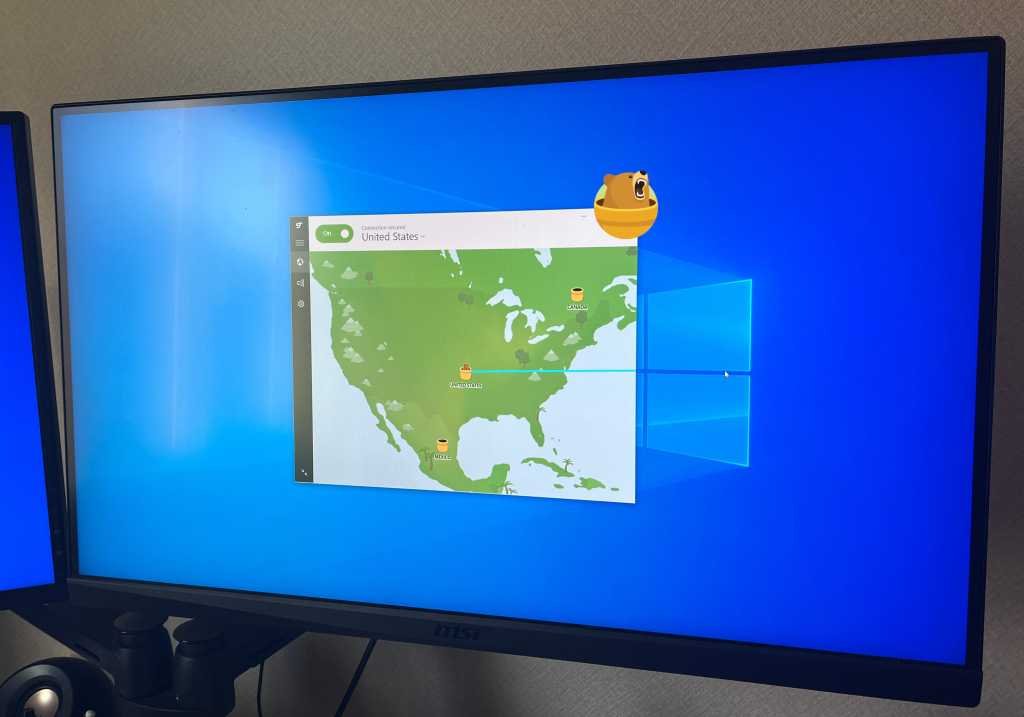TunnelBear has always stood out for its charming design and accessible approach to privacy. In 2025, it still holds a strong place among the best VPNs for casual users who want simple, secure protection without digging through technical menus.
I’ve used TunnelBear on and off for years, especially when recommending VPNs to friends and family who are new to internet privacy. It’s approachable, fun, and surprisingly transparent under the hood—especially after being one of the first VPNs to publish regular independent security audits.
While it doesn’t offer all the bells and whistles power users might crave, it still earns its place as a trustworthy no-logs VPN for everyday browsing, basic security, and VPN newbies.
Quick Summary: TunnelBear at a Glance
What I Like
- Adorable, intuitive design
- Annual independent audits
- No-logs policy with clear legal language
- Free plan for light users
- Strong encryption + secure defaults
- Simple browser extensions and mobile apps
What Could Be Better
- Only 2GB/month on free plan
- Limited protocol selection (no WireGuard yet)
- Not ideal for advanced users
- Inconsistent streaming support
- Based in Canada (Five Eyes)
Despite a few limitations, TunnelBear is still one of the best VPNs in 2025 for casual users, families, and beginners who want peace of mind without complexity.
Privacy & Security: Surprisingly Strong Underneath the Bear Suit
Despite its cutesy branding, TunnelBear is serious about privacy. It was among the first VPNs to undergo and publish third-party audits, which it continues to do yearly.
No-Logs Policy
TunnelBear collects:
- No IP addresses
- No DNS queries
- No traffic logs
- No user activity tracking
It does retain minimal data:
- Email address (if provided)
- Bandwidth usage
- Operational data to maintain service
TunnelBear’s privacy policy is short, readable, and honest, and its public audits back it up. It’s a trusted choice for users concerned about surveillance or data exploitation, though its Canadian jurisdiction is worth considering if you need the highest level of protection (e.g., for journalism or activism).
Security Standards
- AES-256-bit encryption
- SHA-256 for authentication
- OpenVPN and IKEv2 protocols
- VigilantBear (kill switch)
- GhostBear (obfuscation for censored regions)
In my testing, TunnelBear passed leak tests, and the kill switch worked well when enabled. GhostBear is limited but can help in regions with moderate censorship, though not as robust as tools in Mullvad or Windscribe.
Features & Functionality: Minimalist but Effective

TunnelBear is built around simplicity. You won’t find custom DNS, port forwarding, or multi-hop—this VPN is designed to just work, with minimal decisions required from the user.
Core Features
- One-click connection
- GhostBear for obfuscation (desktop only)
- VigilantBear kill switch (desktop only)
- Trusted networks (auto-connect when away from home Wi-Fi)
- Split tunneling on Android
This VPN is perfect if you’re not looking to tweak every setting. That said, advanced users may find it a little too limited.
Cross-Platform Support
TunnelBear supports:
- Windows, macOS, iOS, Android
- Chrome and Firefox browser extensions
- Manual setup for Linux (limited)
- No support for routers or Smart TVs
The lack of router or Firestick support makes it less ideal for whole-home VPN setups, but for phone/laptop use, it’s excellent—especially for first-timers.
User Experience: The Easiest VPN You’ll Ever Use

From the first install, TunnelBear feels different—in a good way.
Interface
The app is built around a world map with animated bears that tunnel to your connected server. It’s genuinely fun to use, especially for kids or non-technical users. All the controls are clearly labeled, with no confusing menus or jargon.
There’s no need to choose between protocols or adjust complex settings—TunnelBear does all of that for you in the background.
Mobile Experience
TunnelBear’s mobile apps are just as friendly and easy. Connect with a tap, switch countries with a swipe, and browse safely. It’s fast, light, and dependable for mobile browsing and public Wi-Fi.
Customer Support
Support is via email—no live chat yet—which can be a downside if you need quick answers. However, the help articles are genuinely useful and the tone stays consistent with the brand—clear, helpful, and friendly.
Pricing & Payment Options: Simple, but Not the Cheapest
TunnelBear keeps its pricing model straightforward—just like the rest of its service. While it’s not the cheapest VPN in 2025, it’s fair, with a totally free tier that’s great for occasional use or testing.
Plans and Pricing
- Free Plan: 2GB/month
- Unlimited Plan:
- $3.33/month (billed annually at $39.99)
- No monthly or multi-year plan options currently
- Teams Plan: $5.75/user/month (billed annually)
The free tier is a great introduction, though 2GB won’t go far in 2025. Still, it’s enough for travelers needing protection on public Wi-Fi or for testing the service without a credit card.
The Unlimited plan is affordably priced, but other VPNs (like Surfshark or Windscribe) may offer more for less, especially if you need features like multi-hop or advanced streaming.
Payment Options
- Credit/debit card
- No cryptocurrency support
- No anonymous or cash payment options
This is where TunnelBear shows its mainstream leanings. No crypto or anonymous sign-up might turn off journalists or privacy extremists. If that’s a deal-breaker, you may want to look at Mullvad or IVPN.
Streaming, Torrenting & Censorship: Just Okay, Not Great
TunnelBear isn’t designed with streaming or torrenting in mind, and that shows in day-to-day use. It’s privacy-first, not Netflix-first.
Streaming
In 2025, TunnelBear has some access to streaming platforms, but it’s not consistent:
- U.S. Netflix: works sometimes
- BBC iPlayer: unreliable
- Hulu/Disney+/Amazon Prime: mostly blocked
TunnelBear doesn’t heavily advertise streaming support, and I wouldn’t recommend it as a streaming-first VPN. If you want guaranteed unblocking, ExpressVPN or Proton VPN are more reliable.
Torrenting
Torrenting is technically allowed on all servers, but:
- No port forwarding
- No SOCKS5 proxy
- Slower speeds compared to more torrent-friendly VPNs
In my testing, it works, but it’s not built for heavy P2P users. You’ll be fine for occasional file-sharing, but Windscribe or Mullvad are better no-logs VPNs for torrenting in 2025.
Bypassing Censorship
TunnelBear offers GhostBear, its obfuscation tool, which is useful in:
- Countries with light to moderate censorship (like Turkey or Egypt)
- Schools or workplaces blocking VPN traffic
However, GhostBear is not very reliable in China or Iran, especially compared to more advanced stealth modes from providers like Windscribe or Proton. Still, for casual censorship circumvention, it gets the job done.
Who TunnelBear Is Best For

TunnelBear is built for users who care about privacy, clarity, and ease-of-use—not necessarily bells and whistles.
Best For:
- Beginners who want a dead-simple VPN
- Families or kids (yes, the design helps!)
- Users who value transparency over features
- Anyone testing the waters with a free VPN plan
- Casual travelers needing quick protection on Wi-Fi
Not Ideal For:
- Power users needing advanced features like port forwarding, split tunneling on desktop, or multi-hop
- Streamers who want guaranteed access to every platform
- Privacy extremists or journalists needing anonymous sign-up or cash payment
That said, it’s a great recommendation if you’re helping a less technical friend or family member find their first secure, no-logs VPN in 2025.
Transparency & Ethics: Still One of the Most Trustworthy VPNs Around
TunnelBear continues to lead the industry in transparency, which is impressive for a VPN owned by a larger corporation (McAfee).
Security Audits
TunnelBear undergoes independent audits every year, performed by Cure53, a respected German security firm. These audits are:
- Publicly available
- Clear about what was tested and fixed
- Consistently completed every year since 2017
This kind of long-term, visible commitment is rare—even among more technical VPNs.
Data Collection & Logging
TunnelBear’s no-logs VPN policy is:
- Plainly written
- Independently verified
- Respectful of user privacy
It does collect basic operational data like OS version, bandwidth used, and timestamps for customer support—but nothing tied to your IP or activity.
Jurisdiction
TunnelBear is based in Canada, part of the Five Eyes surveillance alliance. While this might be a red flag for some, the combination of strong encryption, no logs, and annual audits still makes it a safe pick for most users.
Final Verdict: The Easiest VPN to Recommend to Beginners
TunnelBear doesn’t aim to be everything for everyone—and that’s part of its charm. In 2025, it continues to offer a genuinely user-friendly, no-nonsense VPN experience for people who want basic online protection without needing a tech degree.
Is it the most powerful or customizable VPN? No. But for someone looking for a no-logs VPN that’s independently audited, easy to use, and trustworthy, it’s a standout—especially if you’re new to the VPN world.
Final Score: 8.3/10 — Excellent choice for beginners, casual users, and people who want a VPN they can trust without complexity. Power users and streamers may want to look elsewhere, but TunnelBear absolutely earns its place on the list of the best VPNs for privacy in 2025.
Best Alternatives to TunnelBear
If you like TunnelBear’s simplicity and transparency, but want something a little more advanced, here are three solid alternatives:
Proton VPN
- Strong streaming support
- Swiss-based and open-source
- Free tier with unlimited data
- Better for journalists and power users
Mullvad VPN
- No email required, anonymous accounts
- Flat pricing: €5/month
- Excellent for activists, privacy pros, and Linux users
- Great open-source apps and fully audited
Windscribe
- Free tier with 10GB+ data
- Port forwarding, custom firewall rules, and stealth modes
- Great for torrenting and bypassing censorship
- Stronger tools for tech-savvy users
Each of these options continues TunnelBear’s legacy of no-logs privacy, while offering more for specific needs like streaming, torrenting, or hardcore anonymity.
FAQs: TunnelBear VPN in 2025
Is TunnelBear really a no-logs VPN?
Yes. TunnelBear does not log IP addresses, DNS queries, or online activity. Its annual public audits help verify this independently.
Is TunnelBear free?
Yes. The free plan gives you 2GB/month, which is great for testing or light usage. It’s one of the few no-logs VPNs with a truly free tier in 2025.
Can I use TunnelBear for streaming?
It works occasionally for U.S. Netflix and some other platforms, but it’s not reliable. Proton VPN or ExpressVPN are better for consistent streaming.
Does TunnelBear allow torrenting?
Yes, but it’s not optimized for it. There’s no port forwarding, and speeds may vary. Fine for casual P2P use, but better choices exist for frequent torrenters.
Does TunnelBear work in China or other censored countries?
GhostBear (their obfuscation protocol) helps in some restrictive regions, but it’s not reliable in China. Consider Windscribe or Mullvad for more robust censorship evasion.
Is TunnelBear good for journalists or activists?
It’s secure and transparent, but Canada’s jurisdiction and lack of anonymous payment options make it less ideal for high-risk users. IVPN or Mullvad are better suited for that level of threat model.




